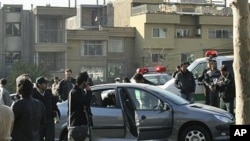IIranian officials are blaming Israeli and U.S. spy agencies for bomb attacks in Tehran Monday that killed a prominent nuclear scientist and wounded another.
Iran media reported attackers on motorcycles attached bombs to two scientists' cars early Monday as they were on their way to work at Shahid Beheshti University in northern Tehran.
One of the blasts killed Iranian nuclear scientist Majid Shahriari and wounded his wife, who was in the car with him. The other blast wounded nuclear physicist Fereidoun Abbasi and his wife.
|
David Kay, Potomac Institute for Policy Studies, Discusses Possible Motives:
|
Iran media and officials blamed the CIA and Israel's Mossad.
Attackers have killed at least two other Iranian nuclear scientists in recent years.
Western nations accuse Iran of pursuing nuclear technology in order to make nuclear weapons - a charge Tehran denies.
In related news, Iranian President Mahmoud Ahmadinejad says several uranium enrichment centrifuges were recently damaged in a cyber attack. Mr. Ahmadinejad says the malicious software was installed in electronic equipment creating temporary problems for a limited number of centrifuges.
Earlier this month, Iranian officials said the country's atomic program was not affected by the computer virus, called Stuxnet.
But the U.N. nuclear agency said Tehran was forced to temporarily halt enrichment earlier this month as a result of an unspecified outage.
Computer experts said the Stuxnet software was designed to disrupt motors that powered gas centrifuges used to enrich uranium.
Some information for this report was provided by AFP and Reuters.














